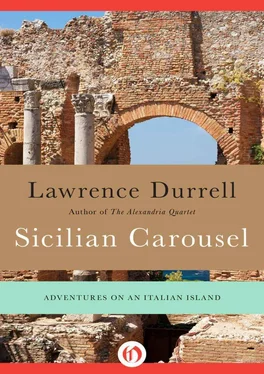T HE TOWN SEEMEDquiet and with little movement despite the earliness of the hour; there was a trifling contretemps at the hotel, where we found that the porters were on strike for the day. We had to hump our suitcases for the night.
This would not have been a very serious matter had the lift not been so cramped, and had the French diplomatic couple learned the elementary art of packing. There seemed to be something absolutely necessary to their peace of mind in each of half a dozen suitcases — so the poor husband had to make several trips. Both Deeds and I could afford to be smug, having put our night clobber in one small case, which enabled us to forget the rest. But even this small suitcase became a problem when one found oneself in the lift with the Frenchman who was humping two large ones and a dozen assorted paper bags. We collided repeatedly and at several angles, bumping first our heads (in a convulsion of reciprocal politeness) and then our booming bags. It was hard to get in and hard to get out; the doors closed automatically if one did not keep them open with one’s foot. Getting out we collided once more in the corridor, when in a sort of hissing anguish my companion said, “ Cher maître , excuse me.”
My heart sank, for I had been recognized; due perhaps to too many television appearances in Paris. But he went on, “Be assured. Your anonymity is safe with me and with my wife. Nobody shall ever know that Lawrence Durrell is with us.” It was like Stendhal meeting Rossini in the lift. He almost genuflected; I suppose that I swelled up with pride like a toad. He walked away backwards down the corridor to his room — like one does for Royalty or the Pope. I went pensively to mine to unpack. Deeds came in with a hip flask and offered me an aperitif before we went down to the cold collation which had been prepared for us in the dining room of the hotel. He approved of my neat packing, and showed quite a streak of psychological insight, for when I said: “I suppose you detect the signs of old maidishness in this mania for tidiness?” he replied, “On the contrary, I detect a camper and a small boat owner. You simply have to be tidy if you are either; since you weren’t in the army I mean.”
After dinner we smoked a cigar in the garden of the hotel and I tried to divine the nature of the town by sniffing the night air — which was pure and scentless. We were on a pleasant but suburban street, made somehow agreeable by flowering oleander which reminded me of Rhodes in a way, modern Rhodes whose towns are made beautiful by this graceful and tough bush which can feast on the bare rock or the crumbling shale of a deserted riverbed — as it does in Cyprus and Sicily alike. The night was still, and balmy. As we walked to and fro the Frenchman came out and spotting us came over with his visiting card in his hand. “As an ancien préfet de Paris ,” he said, “allow me to make myself known. Count Petremand at your service.” His manners were delightful and innocent of guile. Then he added, “I had the great honor once to help your friend Henry Miller, and he was grateful enough to immortalize me in a short story under my own name — imagine how that pleased me. He had been picked up by the police for not having a residence permit — after two years, mind you. Luckily I was at the Prefecture and … well, fixed him up.” I vaguely remembered him now. “But Miller was totally unknown then,” I said, “and he had published nothing.” Count Petremand held up his hand and smiled. “He was an artist,” he said, “and that was enough for us.” It wouldn’t, I thought, be enough for the competent authorities anywhere else — except perhaps Greece. He joined us in a cigar and the three of us took a turn up and down the warm still garden. “I was touched by your mention of my incognito,” I said with feeling. “I have never had any trouble with it before. Once or twice I have nearly been declared persona non grata but that is all. In fact the only cross I have to bear is that everywhere I go I am asked to sign one of my brother’s books. It is invariable.” I must have sounded rather vehement for Deeds looked at me in some surprise and said, “It hasn’t happened yet.” “It will, Deeds. It will.” (Two days later it did. As usual I obliged, signing the book Marcel Proust, with the appropriate flourish.)
Our acquaintance was pushed no further that evening for the Count’s wife appeared with a sheaf of letters for him to address and stamp; and he took his leave, once more with the same exquisite courtesy.
I spent a while longer in the garden, taking the temperature of Syracuse, so to speak; sniffing the warm night like a hound, to divine (or imagine) the faint smell of brine from the invisible sea. The place gave off a feeling of peace and plenitude, and the late moon would rise long after I had drifted into sleep to touch the graceful flowering bushes of hibiscus and oleander which lined the streets. It was in a sense the real beginning of our trip, the first great city whose antiquities we were to visit in any detail; up to now we had been mobilizing ourselves, getting to know one another, improvising. But now the ice had been broken and we were a distinct party. As I came back into the hotel to go to bed I saw the Microscopes sitting in the lounge, the man with his head buried in L’Equipe (The Team) — a weekly sports paper which he had hardly left out of his sight throughout the trip. Either he had a number of copies or he was reading one special issue over and over again. But his concentration was quite ferocious and proof against any other pleasure one might offer him in the way of ruins or landscapes, even food and drink — for at meals he read at table. Well, as I passed them I saw his wife put her hand on his arm and say with real feeling, “ Eric, si tu continue comme ça je sens que je perderai l’oriflamme .” It was so ridiculous as a remark that it took my breath away.
“I remember you saying once that there was something very slightly suspect about our Mediterranean raptures — I mean the islomania we invented in Cyprus and which characterized all your previous poetic transactions with Rhodes and Corfu. I suddenly recalled this remark on a sunny afternoon when I was sitting in the Greek theater of Syracuse, knitting, and reading while the children foraged for stalks of grass to chew.”
She had forgotten the provenance of the remark, but I recalled it quite distinctly. It had suddenly occurred to me that we had given very little thought to what these islands, Cyprus or Sicily, must have been like before the extraordinary efflorescence of temples and statues had taken place — all the paraphernalia of a fully-fashioned and self-confident culture which had created plenty out of barrenness, beauty out of the incoherence of a nature run wild; piety, literacy, art. It is sufficient to cast an eye over the leavings of earlier cultures to be aware of the sweeping definitive-ness of the Greek thrust — its glorious freedom from self-doubt, hesitation. But it was as much due to what they planted in the ground as to what they erected upon it in the way of cities, temples, and harbors. In a sense all our thinking about the Mediterranean crystallized around the images planted here by the Greeks — in this Greater Greece, so aptly named. In Sicily one sees that the Mediterranean evolved at the same rhythm as man, they both evolved together. One interpreted itself to the other, and out of the interaction Greek culture was first born. If it becomes clearer in Sicily than elsewhere it is because when the Greeks arrived their homegrown culture was at meridian, and the similarity of landscape and climate did not impose upon them any modifications, either of worship or of jurisprudence or of politics. Athens evolved as piously and rigorously here as it did in Greece proper. I use the name loosely for the first settlers came from various places; but the cultural problems, even to their bitter differences and disputes, were first broached in Athens and by Athens. In a sense the word Greek and the word Athens are interchangeable except for purists and historians.
Читать дальше











